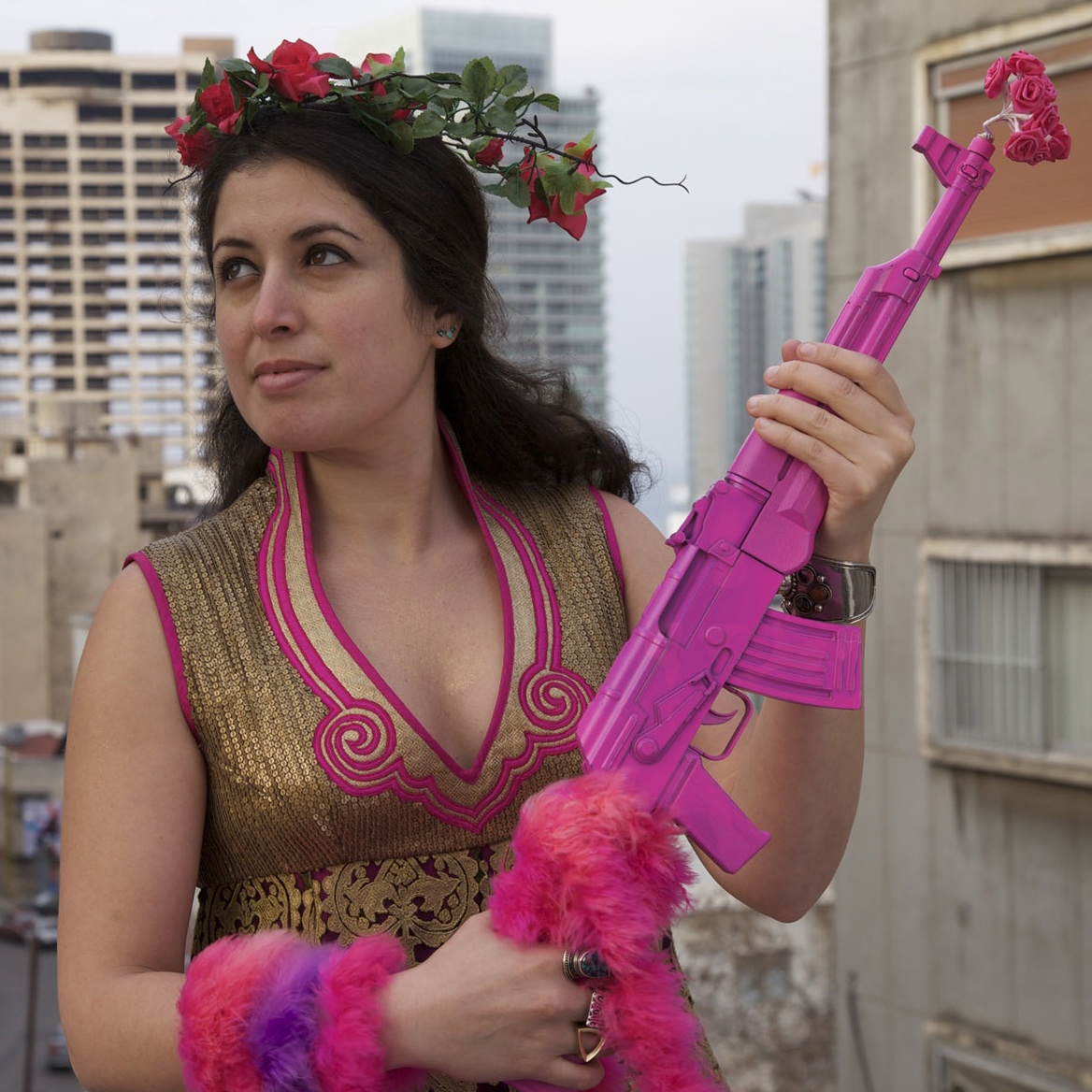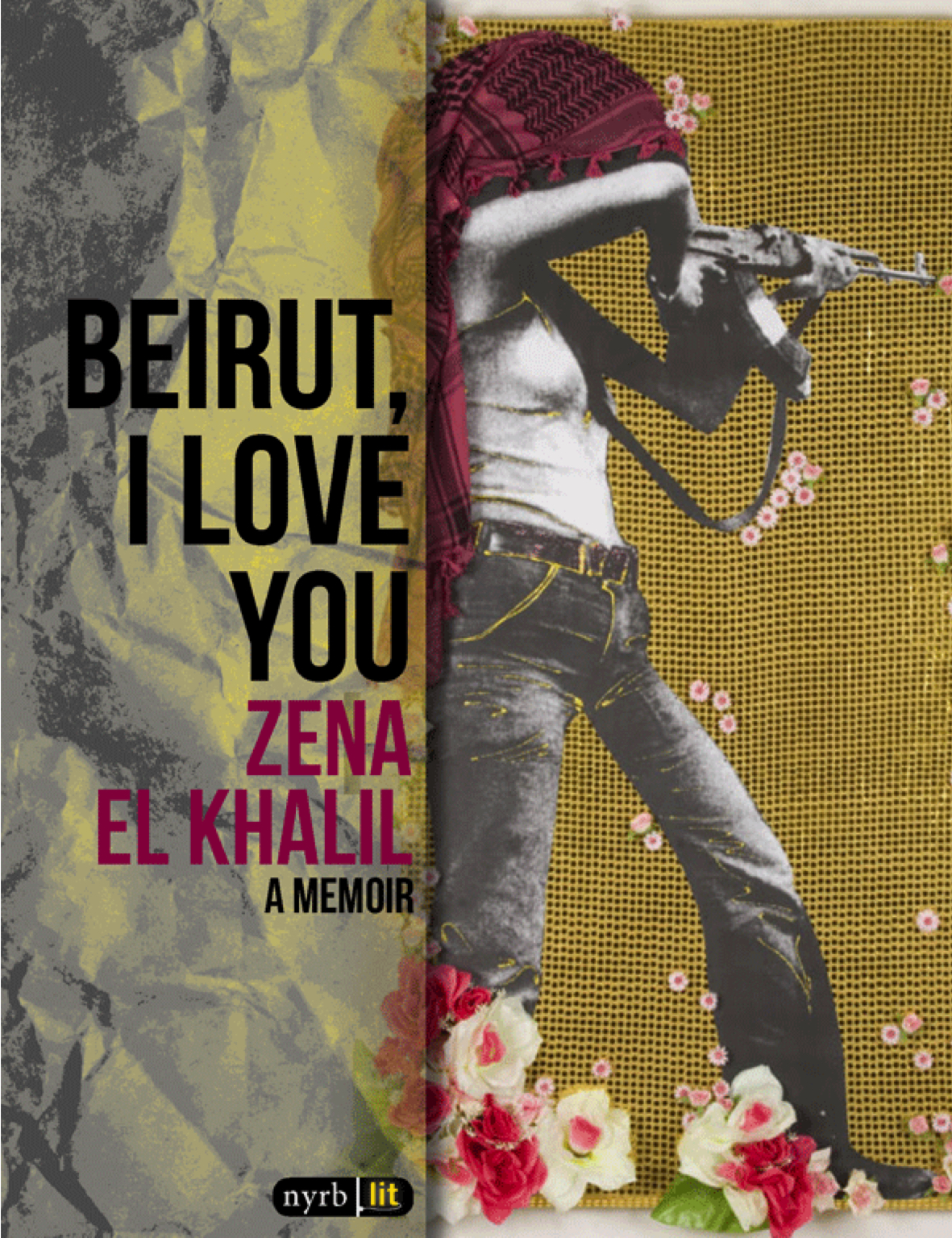‘Lebanon was, and always will be schizophrenic’
Looking at the gaudy, glittery works of the Lebanese artist Zena El Khalil, one is presented with a telling glimpse into the soul of a fabled city as famous for its hedonism and liberality as its bloody history and intermittent outbursts of hysteria. Bearded religious authorities grin benignly aside half-naked female pop stars, boyish militiamen rest poised, Rambo-like, against colourful backdrops of yellow and blue clutching hot pink AK47s, and groups of mourners bawl amidst hodgepodges of confetti, stars, and arabesques. It’s at once manic, contradictory, and perhaps even ludicrous, and the artist makes no bones about it; it is what it is. This is El Khalil’s Beirut, and she loves it.
Lebanon was, and always will be schizophrenic, she remarks in her memoir, Beirut, I Love You, which was recently released in North America this past October. It’s a rather bold and blunt statement for one to make, but then again, modesty has never been a word in El Khalil’s lexicon. With stark and brutal honesty, the artist retraces her footsteps from sunny Lagos to a cold and alien post-9/11 New York, eventually making her way towards the object of her affection, Beirut. Though one might initially expect Zena’s story to revolve around her art, it instead reads like a collection of diary entries, which are spontaneous, erratic, and unpredictable, yet nonetheless cohesive and well-structured. Without reservation, El Khalil divulges to the reader in vivid detail tales of failed relationships, sexual escapades, inner struggles, personal tragedies, and the pandemonium of war. Narrating her tales as if she were chatting away over cigarettes and coffee, she is all the while irreverent, romantic, crude, and above all, painfully sincere.
As in her art, the Beirut depicted by El Khalil appears as a mélange of contradictions and dichotomies. Flipping through the pages of her book – embellished with the artist’s intermittent scribbles and doodles – one finds themselves in the throbbing heart of the Levant, vicariously experiencing Beirut full-throttle through a young, brazen green-eyed tomboy with a penchant for booze, an aversion to denim, and a yearning to find her place in a land in which she is both a native and an outsider. Brushing shoulders with bleach-blondes in miniskirts, girls in chadors, overly-sexed studs, and affable Hezbollahis whilst navigating ancient thoroughfares and bullet-ridden avenues, the palpable schisms of the ‘Paris of the Middle East’ are exposed to the reader in their entirety. Here, the dichotomies of East and West Beirut, Muslim and Christian, Arab and Phoenician, and pre and post-war (amongst others) are brought to life with a simplicity and cheek that only the likes of El Khalil could pull off.
Aside from the stark realism and candidness with which she relates her story, El Khalil also provides readers with as impartial a perspective as could possibly be expected from a Beiruti. Glossing over the proverbial religious, political, and ideological rifts that usually find their way in discourses about the city, El Khalil takes no particular side, and rather strives to portray the human side of all of Beirut’s multilayered, colourful characters, who at times appear as schizophrenic as the city itself. Beirut, cut me some slack. Does it always have to be this complicated?
Beirut is at once her pleasure and pain, her sorrow and joy, and as El Khalil would likely admit, her only refuge
As remarkable as the characters she comes across may be, however, as well as her flippant and poignant descriptions of Beirut, there’s something else lying at the heart of this memoir, which is El Khalil’s piece de resistance. More than anything, Beirut, I Love You is a story about overcoming the odds, staying true to one’s roots, and coping with the bitter realities of conflict and war. In an iconic photo of the artist, El Khalil appears – not unlike the subjects in her work – boldly gazing out into the distance among a sea of drab apartment buildings, AK47 in hand (hot pink, of course), and with a wreath of roses atop her head, looking every bit the Lebanese superwoman, if there ever was one. On the surface, it all seems a bit frivolous, although upon digging into her stories, one comes to regard El Khalil as more of a warrior than a writer - or even an artist - as she casts all doubts about her superhero persona aside. Having lived as an Arab in New York during 9/11, experienced the 2006 war with Israel firsthand, battled myriad inner demons, and lost her best friend to cancer, El Khalil’s struggles have been many; however, she’s anything but bitter, and it’s with nothing but humour and grace that she looks back on her trials and tribulations, speaking of both triumphant victories and painful recoveries.
Ultimately, El Khalil imparts that it’s all about staying true to oneself, and making the best of what one has. Born in London, raised in Lagos, and educated in New York, El Khalil had the liberty to choose where she wanted to live, and she chose Beirut – or perhaps Beirut chose her. Either way, she accepted her destiny with grace, staying true to her beloved city through thick and thin, as steadfast and firmly rooted as the resplendent cedars of her ancestral homeland. Yes, El Khalil admits with utmost sincerity, there will be more wars, more deaths, and more destruction yet; but Beirut is home - c’est la vie. There will be war again, my children will experience it, whether they like it or not. It is a Lebanese reality.
In between her tales of love and war, El Khalil paints a picture of Beirut that is as extreme as the city itself, at once embodying the serenity of a sunset in Byblos and the frenzy of a full-blown bloodbath. At times, it’s as soothing as the silken songs of Fairuz, and at others, as haunting as the ghostly spirits of an ever-looming past. It’s at once her pleasure and pain, her sorrow and joy, and as El Khalil would likely admit, her only refuge. As the pages of her fantastic journey come to an end, however, all these dichotomies, schisms, and polarities seemingly fade away beyond the Mediterranean, leaving one with sultry words whispered in a lover’s ear, in a moment of ecstasy as transient as Lebanon’s brief but golden episodes of respite:
I whisper into his ear, ‘I love Beirut’.
We start to kiss.
It is good.
I am so far away from death.


